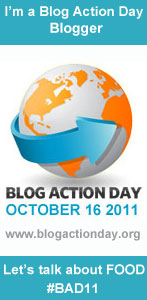Action > Anger
More productive than a generic call to arms to voice our collective anger is a specific call to action that can help overcome real injustices.
If you spend any time reading about food policy, you might have felt a strong wind at your back pushing you vaguely in the direction of Zuccotti Park last week. Some of my favorite food bloggerati including Jane Black, Mark Bittman, Tom Philpott, and Kristin Wartman (among several others) all wrote compelling pieces urging those of us in the “food movement” to start to align ourselves squarely within the ranks of the 99%.

And they’re right. As Philpott writes, “as Occupy Wall Street evolves, food policy should be on the plate.” The food movement needs more energy, more creativity, and as Black suggests, a more ruthless commitment to “winning” political battles. If productively directed, the dynamic power that #OWS seems to be building could be a promising addition to the movement’s arsenal. The only problem in reading these articles, is one gets the idea that food reformers don’t actually know all of this already. In reality there are many of us in the food movement who spend our lives doing just this. But, it’s much easier to talk about the injustices and failures of our food system than it is to motivate action on specific winnable battles.
Protest is essential. Voicing anger and dissatisfaction with the countless failures of our political, financial, and food systems helps bring to light the injustice embedded in how these systems can distort our society and undermine our health, security, and general well-being. But, more productive than a generic call to arms to voice our collective anger, is a specific call to action that can help overcome real injustices.
Among the issues raised by Black, Bittman, Philpott, and Wartman are the financial industry’s impact on food prices, the drive by investors to acquire land in developing countries, and the need to raise revenue from the banks that helped create the economic mess we currently face. Here are a few examples of what Oxfam is trying to do on each of these issues to create real, concrete change, and some ways that individuals, including our friends in the bloggerati, can help. Alone, none of these actions will create the bold institutional reforms our food system needs, but they’re a darn good start:
Last week Oxfam released a letter from 461 economists urging regulators to reign in excessive speculation on commodities that drives food price spikes and hunger:
You can sign your own letter to the top regulator at the CFTC urging strong action here:
http://www.change.org/petitions/world-food-day-action-cftc-should-regulate-commodities-trading-2
Last month Oxfam revealed that major corporations are pushing poor farmers in the developing world off of their land and into hunger and poverty. Since our report release, farmers in Uganda who spoke out against land grabs have felt intimidation and harassment after questioning from the New Forests Company:
www.oxfamamerica.org/landgrab
You can send a letter to the CEO of the New Forests Company, 20% of which is owned by the major international bank HSBC, demanding that he take immediate action now to bring justice to these communities:
https://secure.oxfamamerica.org/site/Advocacy?cmd=display&page=UserAction&id=1273
Around the world, momentum is building behind a tiny tax on bankers that could generate billions of dollars to help with problems at home and overseas:
http://www.oxfam.org/en/campaigns/health-education/robin-hood-tax
You can add your voice to this campaign joining tens of thousands of other advocates in urging leaders of the G20 nations to put this tiny tax into place and help millions of people in the US and around the world get the health care, education, clean water, and nutritious food they need:
http://www.oxfam.org/en/campaigns/health-education/robin-hood-tax